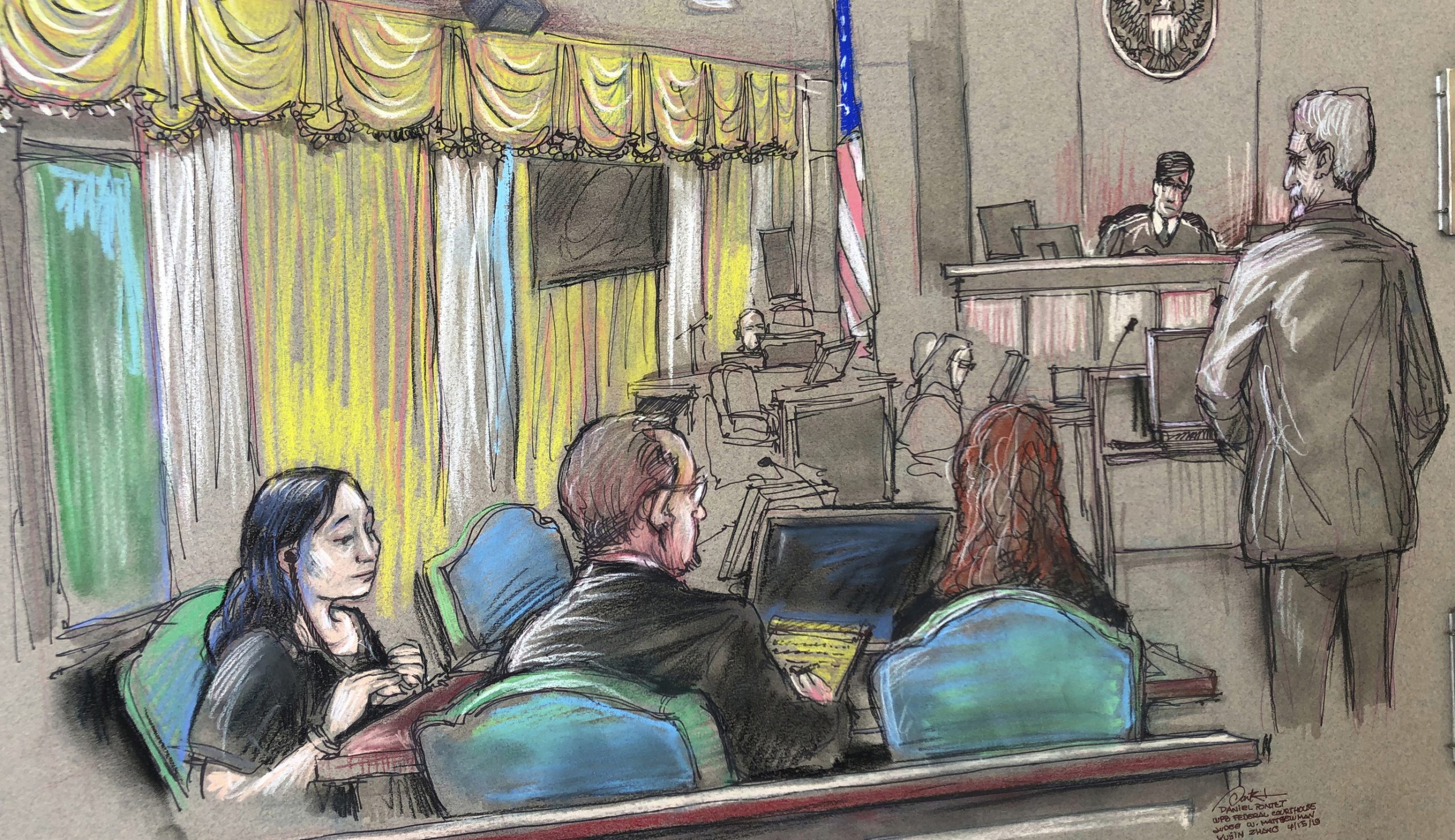FORT LAUDERDALE, Florida — The Chinese woman accused of trespassing at President Trump’s Florida resort and lying to federal agents about why she was there was convicted on both counts Wednesday in a case that could eventually have national security implications.
Federal prosecutors argued Yujing Zhang, 33, was a calculated liar who proceeded with her plan to access Mar-a-Lago, despite being told an event she planned to attend had been canceled and that she could not go to the property without prior permission. They filed classified information under seal in the case at least twice and said Monday evening they would do so a third time, indicating a national security investigation into Zhang.
“She was not a wandering tourist that fell into this place by mistake,” Assistant U.S. Attorney Michael Sherwin said.
Zhang, who represented herself despite numerous pleas from U.S. District Judge Roy Altman to use a public defender on standby, often stalled court proceedings with her lack of knowledge about the American criminal justice system and questions about why the trial was even taking place.

The bizarre trial began with an argument over Zhang’s undergarments when she showed up wearing her jail uniform instead of the silk shirt and tan dress pants provided to her by the public defender she fired this summer. Zhang indicated she did not feel comfortable wearing the outfit because she was not given a bra and underwear by the jail.
Zhang flew from Shanghai to Newark, New Jersey, on March 28, then made her way to Palm Beach, Florida, on a one-way ticket. Secret Service agent Sam Ivanovich, who first spoke with Zhang in the lobby of Mar-a-Lago, said Zhang told him after she was taken into custody that she expected to spend about two weeks in the country.
When she arrived at a Mar-a-Lago security checkpoint on March 30, security originally believed Zhang was related to a member of the club and came there to swim. They allowed her onto the property, but a receptionist said she did not recognize Zhang as a member or a guest of a member when she entered the lobby.
Ariela Grumaz, the receptionist, said Zhang was “acting very weird and strange” in her interactions with the Chinese national. She said Zhang, who was wearing a long gray dress that seemed inappropriate for that time of day, was recording video with her phone, despite a club policy prohibiting members from taking photos and video, and when Grumaz went to ask Zhang to leave the bathroom after she had been there a while, she found the woman pacing back and forth while using her phone.
Grumaz and Secret Service agents testified that Zhang conversed in English with them but gave little information as to why she was there, other than to attend a United Nations Chinese American Association event in the evening. Grumaz said she told Zhang there was no such event.
Unable to verify why she was there, Secret Service agents escorted Zhang off the property, where the president’s family was staying at the time, to question her.
Ivanovich said Zhang told him she originally booked her flights through “Charles,” whom she communicated with over the Chinese messaging app WeChat, but after complications, she booked the travel herself on March 27. The Secret Service agent said Zhang became “aggressive” after she consented to a search of the cellphones and laptop she had with her.
In her WeChat communications, investigators found a contract dated Feb. 14 between Zhang and the “Beijing Peace Friendship Enterprise Management Company” in which Zhang agreed to pay $20,000 to go to Mar-a-Lago for a March 30 event. On March 18, Zhang received an audio message telling her the event would likely be canceled and her ticket could be refunded. She received another message on March 26 that the event “has been put on hold for now.”
Zhang sent several messages a day, later asking for a refund. “Wire it straight to my account,” she wrote. “I’m not going,” another message said. In a third message, she said she needed the money “urgently” by the weekend.
An audio message to Zhang on March 29, a day before she arrived at Mar-a-Lago, again noted the event was canceled. “The problem is not on you,” the message said. “It’s not you. It’s because they are having a political event at Trump’s estate, therefore canceled this one.”
Regardless of the messages, Zhang still went to Mar-a-Lago, where she passed numerous large signs warning that she was entering a restricted area and “persons entering without lawful authority are subject to arrest and prosecution.”
“She was bound and determined to get on that property,” Assistant U.S. Attorney Rolando Garcia said, adding that she would never have been allowed access to Mar-a-Lago if she had said she was there for the United Nations event.
“I will say I’ve made contract to go to Mar-a-Lago to see president and his family, Ivanka,” the Chinese national said in a brief closing statement. “I did nothing wrong. … I did no lying.”
Zhang spoke very little during the trial, sometimes objecting to evidence shown by prosecutors but giving no explanation for the objection beyond “it’s sensitive” or “it’s personal.” All of her objections were overruled.
She faces 6 years in prison for the convictions.

